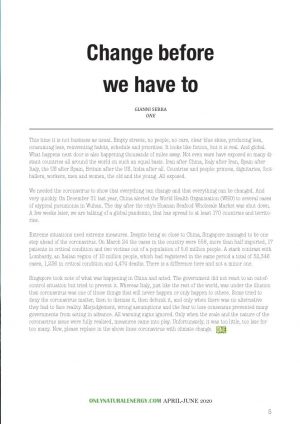 This time it is not business as usual. Empty streets, no people, no cars, clear blue skies, producing less, consuming less, reinventing habits, schedule and priorities. It looks like fiction, but it is real. And global. What happens next door is also happening thousands of miles away. Not even wars have exposed so many distant countries all around the world on such an equal basis. Iran after China, Italy after Iran, Spain after Italy, the US after Spain, Britain after the US, India after all. Countries and people: princes, dignitaries, footballers, workers, men and women, the old and the young. All exposed.
This time it is not business as usual. Empty streets, no people, no cars, clear blue skies, producing less, consuming less, reinventing habits, schedule and priorities. It looks like fiction, but it is real. And global. What happens next door is also happening thousands of miles away. Not even wars have exposed so many distant countries all around the world on such an equal basis. Iran after China, Italy after Iran, Spain after Italy, the US after Spain, Britain after the US, India after all. Countries and people: princes, dignitaries, footballers, workers, men and women, the old and the young. All exposed.
We needed the coronavirus to show that everything can change and that everything can be changed. And very quickly. On December 31 last year, China alerted the World Health Organisation (WHO) to several cases of atypical pneumonia in Wuhan. The day after the city’s Huanan Seafood Wholesale Market was shut down. A few weeks later, we are talking of a global pandemic, that has spread to at least 170 countries and territories.
Extreme situations need extreme measures. Despite being so close to China, Singapore managed to be one step ahead of the coronavirus. On March 24 the cases in the country were 558, more than half imported, 17 patients in critical condition and two victims out of a population of 5.6 million people. A stark contrast with Lombardy, an Italian region of 10 million people, which had registered in the same period a total of 32,346 cases, 1,236 in critical condition and 4,474 deaths. There is a difference here and not a minor one.
Singapore took note of what was happening in China and acted. The government did not react to an out-of-control situation but tried to prevent it. Whereas Italy, just like the rest of the world, was under the illusion that coronavirus was one of those things that will never happen or only happen to others. Some tried to deny the coronavirus matter, then to dismiss it, then debunk it, and only when there was no alternative they had to face reality. Misjudgement, wrong assumptions and the fear to lose consensus prevented many governments from acting in advance. All warning signs ignored. Only when the scale and the nature of the coronavirus issue were fully realised, measures came into play. Unfortunately, it was too little, too late for too many. Now, please replace in the above lines coronavirus with climate change.
Gianni Serra





